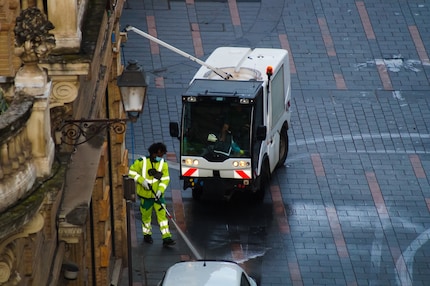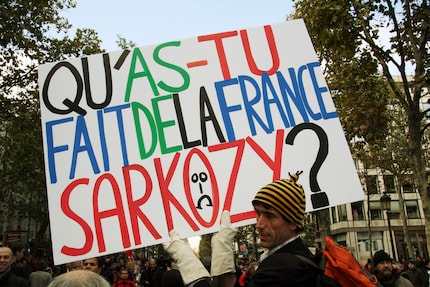
Background information
The final storm before an eternal rest
by Carolin Teufelberger

When I think about Kärcher, a number of adjectives come to mind: yellow, efficient, cosy, middle class, market leader. But no one in Switzerland would associate it with right-wing slogans. It’s a different story in France.
In Switzerland, Kärcher is synonymous with an efficient high-pressure cleaner. Maybe bit of a bourgeois gadget, standing for a middle-class life with house, garden, child, dog, Kärcher. Yet, the Kärcher brand is so well known that its name is even used to describe the category of high-pressure cleaners in general and in German, the verb «kärchern» is commonly used to mean «cleaning».
This is no different in France, where high pressure is used to clean the streets of dirt. An activity that’s often described as «nettoyage de Karcher» instead of «nettoyage haute pression» – cleaning with Kärcher instead of cleaning with high pressure. This is evidence of the market dominance of the family business from Baden-Württemberg. Even if this popular saying doesn’t always have positive connotations.

It’s 19 June 2005. Nicolas Sarkozy, who later became President of France, is Minister of the Interior. In the «Cité des 4000», a neighbourhood of the city of La Courneuve, which forms part of the banlieues around Paris, an eleven-year-old boy is killed by a stray bullet (article in German). The next day, Sarkozy promises the grieving mother to clean this suburban area with a Kärcher: «On va nettoyer au Karcher la cité des 4000».
This sentence isn’t well received – neither by the media, nor among the young people of the Paris suburb. They feel like they’re being treated like dirt. Literally. Sarkozy seems little bothered by this wave of outrage. Ten days after the incident, he repeats his words in front of the media.
In the autumn of the same year, the Paris suburbs erupt into violence (article in German). Statements such as «nettoyer au Karcher», which becomes an expression of the lack of understanding between government and youth, played its part in this incident.
The company Kärcher is less than thrilled to be associated with inhumane statements. Represented in 72 countries worldwide, it strives to maintain a clean-cut image everywhere. Since the 1980s, for example, Kärcher has been cleaning landmarks such as Mount Rushmore in South Dakota, the Brandenburg Gate in Berlin, the Christo statue in Rio de Janeiro and the Luxor obelisk in the middle of Paris – free of charge.
Sarkozy's statement, meanwhile, seems to have turned into a catchphrase already. The saying exists to this day. It’s used again and again by right-wing politicians. Kärcher fights back and denounces the politicisation of its own name. The company places ads in France stating that it wants to clean itself of politics. Kärcher publishes protest letters and warns presidential candidates not to misuse the brand name in their election campaign – they did so in the latest election campaign earlier this year, too.
And yet, Valérie Pécresse, Republican presidential candidate, said: «Il faut ressortir le Kärcher. Il a été remisé à la cave par François Hollande et Emmanuel Macron depuis plus de dix ans.» In English: «We need to get the Kärcher out again. It’s been left in the basement by François Hollande and Emmanuel Macron for over ten years.» Her statement didn’t help her, though, as she got less than five percent of the votes in the first round of voting on 10 April 2022.

Kärcher itself comments on this misuse of the name and the negative association that goes with it as follows: «The Kärcher group has been fighting for years to ensure that its brand is not exploited in the French political scene, where it has no place, and is opposed to it being associated with any political party or ideology. Kärcher asks political figures and the media to immediately cease all use of its name in the political sphere. This is damaging to the brand and to the values of the company.»
After that, reference is made to the support of SOS Children's Villages, the aforementioned cost-free cleaning efforts and a «reverse graffiti» on a dam. For this piece of art, Kärcher created a drawing by pressure-cleaning dirt off the surface of the dam. It looks great, and I'm sure the public is more keen to see this than vandalism. A clean conscience graffiti without controversy – which probably takes us back to bourgeois life. 😉
My life in a nutshell? On a quest to broaden my horizon. I love discovering and learning new skills and I see a chance to experience something new in everything – be it travelling, reading, cooking, movies or DIY.
Interesting facts about products, behind-the-scenes looks at manufacturers and deep-dives on interesting people.
Show all